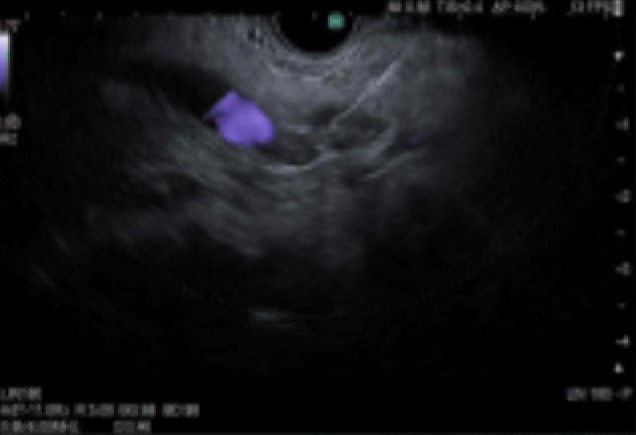Back


Poster Session C - Monday Afternoon
Category: Colon
C0137 - A Rare Case of Medullary Carcinoma of the Colon With Lymphatic Metastasis
Monday, October 24, 2022
3:00 PM – 5:00 PM ET
Location: Crown Ballroom

Has Audio
.jpg)
Zainab Shahid, DO
Rowan SOM/ Jefferson NJ/ Virtua OLOL
Stratford, NJ
Presenting Author(s)
Zainab Shahid, DO1, Charles Yang, DO2, Matthew Everwine, DO3, Punitha Shivaprasad, DO4
1Rowan SOM/ Jefferson NJ/ Virtua OLOL, Stratford, NJ; 2Thomas Jefferson University, Voorhees, NJ; 3Jefferson NJ, Stratford, NJ; 4Virtua Voorhees, Voorhees, NJ
Introduction: Medullary carcinoma of the colon (MAC) is a rare cancer encompassing only .03% of all colorectal carcinomas. We present a rare case of MAC occurring in an older adult with a strong tobacco use history.
Case Description/Methods: A 76-year-old female with PMHx of tobacco use disorder, COPD, and known pulmonary nodules presented to the ED for surveillance of her pulmonary nodules. A review of systems was positive for chronic shortness of breath and cough. A CT scan of the chest revealed enlarging lung nodules and mediastinal adenopathy. A PET scan revealed a hypermetabolic 2.5 x 2.5 cm soft mass in the distal ascending colon and hypermetabolic lymph nodes in the right upper quadrant. Colonoscopy revealed an infiltrative 2 cm mass at the hepatic flexure, and pathology revealed an invasive, poorly differentiated adenocarcinoma with normal expression of MSH2 and MSH6 and absence of MLH1 and PMS2. These findings were consistent with medullary carcinoma of the colon. Endoscopic ultrasound with biopsy of peripancreatic and porta-hepatis lymph nodes favored metastatic medullary carcinoma. The patient underwent a right hemicolectomy and follows closely outpatient.
Discussion: MAC is a rare cancer associated with a high level of microsatellite instability and deficient mismatch repair proteins. It is a non-gland forming cancer composed of large polygonal eosinophilic cells growing in solid sheets and infiltrated with small lymphocytes. The majority of reported cases revealed a lack of MLH-1 and PMS2, just as our patient did. They instead express markers that are not commonly associated with colorectal cancers, such as calretinin, CK7, SATB2, and CDH17. MACs were previously difficult to differentiate from poorly differentiated adenocarcinomas due to their unique tumor marker expression and histopathology. The current standard for diagnosis of MAC therefore requires distinct microscopic morphology and molecular staining patterns. There are no current treatment guidelines due to the rarity of MACs, although MACs do have a favorable prognosis when compared to other adenocarcinomas and surgical resection and FOLFOX chemotherapy have been used successfully in some studies. Although MACs have been sporadically reported in case reports, further studies are required to determine guidelines for both diagnosis and treatment of this rare disease.

Disclosures:
Zainab Shahid, DO1, Charles Yang, DO2, Matthew Everwine, DO3, Punitha Shivaprasad, DO4. C0137 - A Rare Case of Medullary Carcinoma of the Colon With Lymphatic Metastasis, ACG 2022 Annual Scientific Meeting Abstracts. Charlotte, NC: American College of Gastroenterology.
1Rowan SOM/ Jefferson NJ/ Virtua OLOL, Stratford, NJ; 2Thomas Jefferson University, Voorhees, NJ; 3Jefferson NJ, Stratford, NJ; 4Virtua Voorhees, Voorhees, NJ
Introduction: Medullary carcinoma of the colon (MAC) is a rare cancer encompassing only .03% of all colorectal carcinomas. We present a rare case of MAC occurring in an older adult with a strong tobacco use history.
Case Description/Methods: A 76-year-old female with PMHx of tobacco use disorder, COPD, and known pulmonary nodules presented to the ED for surveillance of her pulmonary nodules. A review of systems was positive for chronic shortness of breath and cough. A CT scan of the chest revealed enlarging lung nodules and mediastinal adenopathy. A PET scan revealed a hypermetabolic 2.5 x 2.5 cm soft mass in the distal ascending colon and hypermetabolic lymph nodes in the right upper quadrant. Colonoscopy revealed an infiltrative 2 cm mass at the hepatic flexure, and pathology revealed an invasive, poorly differentiated adenocarcinoma with normal expression of MSH2 and MSH6 and absence of MLH1 and PMS2. These findings were consistent with medullary carcinoma of the colon. Endoscopic ultrasound with biopsy of peripancreatic and porta-hepatis lymph nodes favored metastatic medullary carcinoma. The patient underwent a right hemicolectomy and follows closely outpatient.
Discussion: MAC is a rare cancer associated with a high level of microsatellite instability and deficient mismatch repair proteins. It is a non-gland forming cancer composed of large polygonal eosinophilic cells growing in solid sheets and infiltrated with small lymphocytes. The majority of reported cases revealed a lack of MLH-1 and PMS2, just as our patient did. They instead express markers that are not commonly associated with colorectal cancers, such as calretinin, CK7, SATB2, and CDH17. MACs were previously difficult to differentiate from poorly differentiated adenocarcinomas due to their unique tumor marker expression and histopathology. The current standard for diagnosis of MAC therefore requires distinct microscopic morphology and molecular staining patterns. There are no current treatment guidelines due to the rarity of MACs, although MACs do have a favorable prognosis when compared to other adenocarcinomas and surgical resection and FOLFOX chemotherapy have been used successfully in some studies. Although MACs have been sporadically reported in case reports, further studies are required to determine guidelines for both diagnosis and treatment of this rare disease.

Figure: Endoscopic Visualization with Final Needle Aspiration of Abnormal Lymph Node
Disclosures:
Zainab Shahid indicated no relevant financial relationships.
Charles Yang indicated no relevant financial relationships.
Matthew Everwine indicated no relevant financial relationships.
Punitha Shivaprasad indicated no relevant financial relationships.
Zainab Shahid, DO1, Charles Yang, DO2, Matthew Everwine, DO3, Punitha Shivaprasad, DO4. C0137 - A Rare Case of Medullary Carcinoma of the Colon With Lymphatic Metastasis, ACG 2022 Annual Scientific Meeting Abstracts. Charlotte, NC: American College of Gastroenterology.
